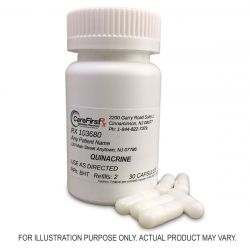Quinacrine for Lupus
Quinacrine for Lupus
Systemic lupus erythematosus (lupus) is a chronic (long-lasting) autoimmune disease. Lupus occurs when the immune system, which normally helps protect the body from infection and disease, attacks its own tissues. This attack causes inflammation, and in some cases permanent tissue damage, which can be widespread – affecting the skin, joints, heart, lung, kidneys, circulating blood cells, and brain. Lupus can affect anyone, however it is most prominent in women of African American or Asian descent. The symptoms of lupus can range from mild to severe and can include the following: arthritis, joint stiffness, fevers, fatigue, “butterfly” rash, sensitivity to the sun, and sores, which are usually painless, in the nose and mouth. However this is not an all inclusive list of symptoms, and some symptoms can even progress to organ damage due to inflammation. For example, some lupus patients are more prone to developing cardiovascular disease due to inflammation of the heart and blood vessel tissues, which can lead to atherosclerosis, which happens when fat and other materials attach to the blood vessel wall and form plaque. Although lupus is a chronic disease with no cure, there are treatments available to manage this disease.
Most of the treatments currently available for lupus are for symptom management. First line treatment of musculoskeletal pain associated with lupus include corticosteroids and antimalarials. Anti inflammatory drugs, such as ibuprofen or acetaminophen, and corticosteroids can help decrease the amount of inflammation within the body and help treat pain or fever. Antimalarials are also effective in treating fatigue, joint pain, skin rashes, and inflammation of the lungs caused by lupus, thus reducing the frequency of flare ups. Immunosuppressants, such as azathioprine, cyclophosphamide, and mycophenolate help suppress or curb the overactive immune system associated with lupus. However, extended treatment with immunosuppressants increases the risk of side effects, therefore it is reserved for patients with life threatening conditions such as kidney inflammation or lung/heart lupus.
Originally indicated for the prevention of malaria, antimalarials have piqued interest in clinicians as a treatment option for Lupus. Antimalarials such as hydroxychloroquine, chloroquine and quinacrine had notable anti-inflammatory properties when first discovered in the 1950's and have since been used to treat a variety of auto inflammatory diseases, including lupus. Quinacrine is most commonly used as adjuvant therapy for patients resistant to other medications in its class. Long-term therapy with hydroxychloroquine or chloroquine carries the risk of developing a "bull's-eye" macular retinopathy, unlike quinacrine which does not cause increased risk of retinopathy and requires minimal monitoring. Quinacrine has demonstrated dermatologic effects on select patients, causing a harmless yellowing of the skin or conjunctiva which goes away after dose reduction. Quinacrine is dispensed as 100 mg tablets, with a recommended maintenance dose of 100 mg daily. As stated before, Quinacrine is commonly used as adjuvant therapy, and is often combined with hydroxychloroquine, when hydroxychloroquine alone is ineffective (eg, hydroxychloroquine 200–400 mg daily with 50–100 mg quinacrine).
Quinacrine is not approved in the USA, and therefore it is not currently available commercially. However, the FDA has approved for this medication to be compounded for patients living with lupus. In patients with Lupus, quinacrine has been shown to not only reduce the number of disease flares and improve skin symptoms, but also improves glucose control and lipid profiles, has a potent antithrombotic effect, and is useful in the treatment and prevention of nephritis. Thus, this antimalarial therapy significantly reduces the mortality of patients with different forms of lupus.
Since 2020, quinacrine has not been available for compounding. The only FDA approved manufacturer of quinacrine in its raw form for compounding did not pass an FDA inspection, which means they can no longer import quinacrine to the United States until the facility is reinspected or the FDA approves another quinacrine manufacturer. The Lupus Foundation of America in collaboration with American Academy of Dermatology Association, American College of Rheumatology and other organizations issued a letter to the FDA requesting reinspection. CareFirst Specialty Pharmacy with its partners is currently working on qualifying a FDA approved manufacturer for quinacrine and anticipate that quinacrine will be available for compounding in late 2023.
References
- Lupus Foundation of America. What is lupus? [Internet]. Washington (DC): Lupus Foundation of America. c2017. Available from: http://resources.lupus.org/entry/what-is-lupus
- Lupus Foundation of America. Quinacrine shortage [Internet]. Washington (DC): Lupus Foundation of America. c2017. Available from: https://www.lupus.org/blog/quinacrine-shortage-2020
- U.S. Department of Health and Human Services. Systemic lupus erythematosus (lupus) [Internet] National Institute of Arthritis and Musculoskeletal and Skin Diseases. c2020. Available from: https://www.niams.nih.gov/health-topics/lupus/more-info
- Lam NC, Ghetu MV, Bieniek ML. Systemic Lupus Erythematosus: Primary Care Approach to Diagnosis and Management. Am Fam Physician. 2016 Aug 15;94(4):284-94. PMID: 27548593.
- Rheumatologic Dermatology Society. Antimalarial medications [Internet]. Rheumatologic Dermatology Society. c2017. Available from: http://www.rheumaderm-society.org/antimalarial-medications/
- U.S. Food and Drug Administration [Internet]. Quinacrine safety information; 2023 Apr 10 [cited 2023 Sep 27]. Available from: https://www.fda.gov/drugs/human-drug-compounding/compounding-safety-information-quinacrine-hydrochloride
- García-Montero P, Troya-Martín M, Millán-Cayetano J, del Boz J. Actas Dermo-Sifiliográficas [Internet]. Quinacrine: A Treatment Option That Should Not Be Overlooked | Actas Dermo-Sifiliográficas; 2016 [cited 2023 Sep 27]. Available from: https://www.actasdermo.org/es-quinacrine-a-treatment-option-that-articulo-S1578219016302360#bib0065
- Anes Yang, Monisha Gupta, Dr Delwyn Dyall-Smith, Amanda Oakley [Internet]. Quinacrine. DermNet. 2018 September [cited 2023 Sep 29]. Available from: https://dermnetnz.org/topics/quinacrine


Comments